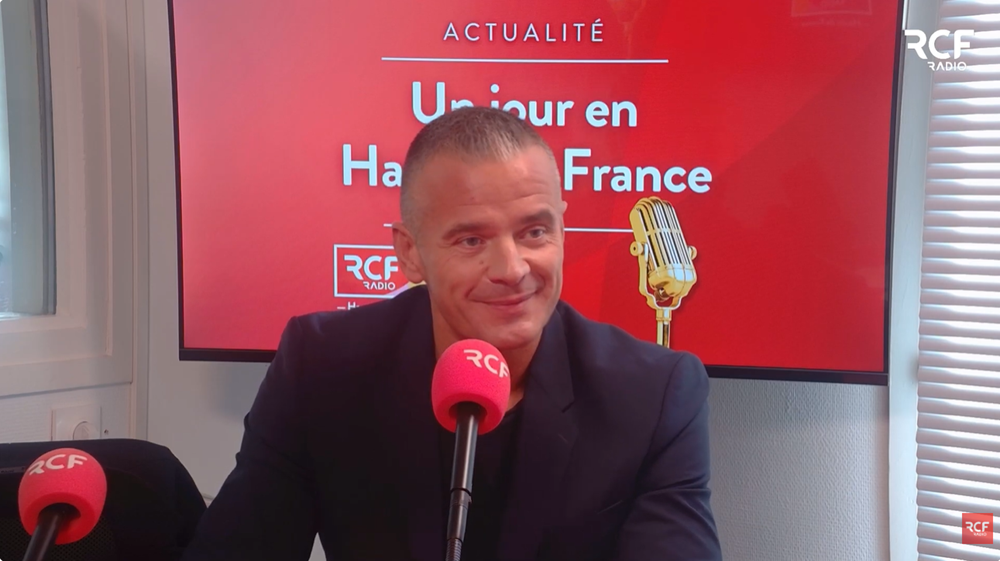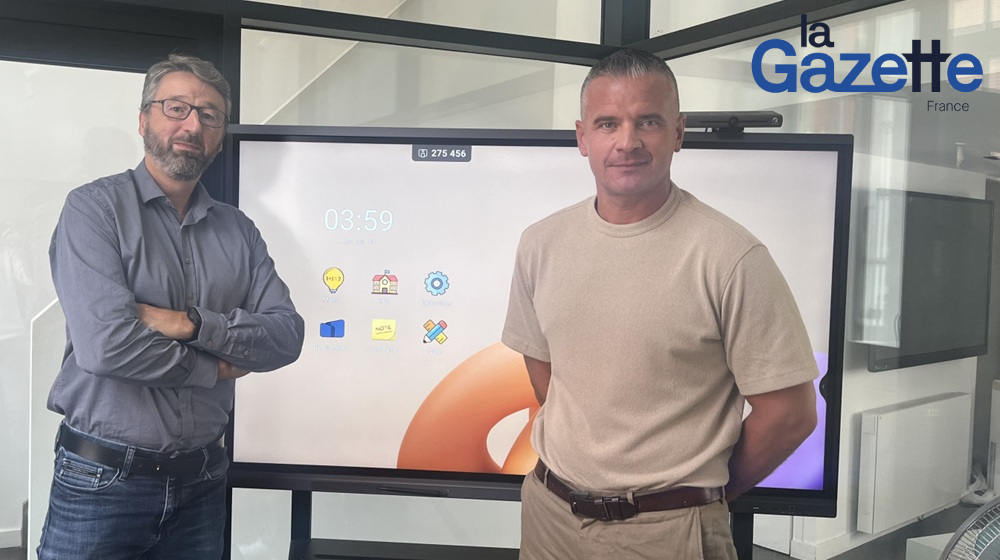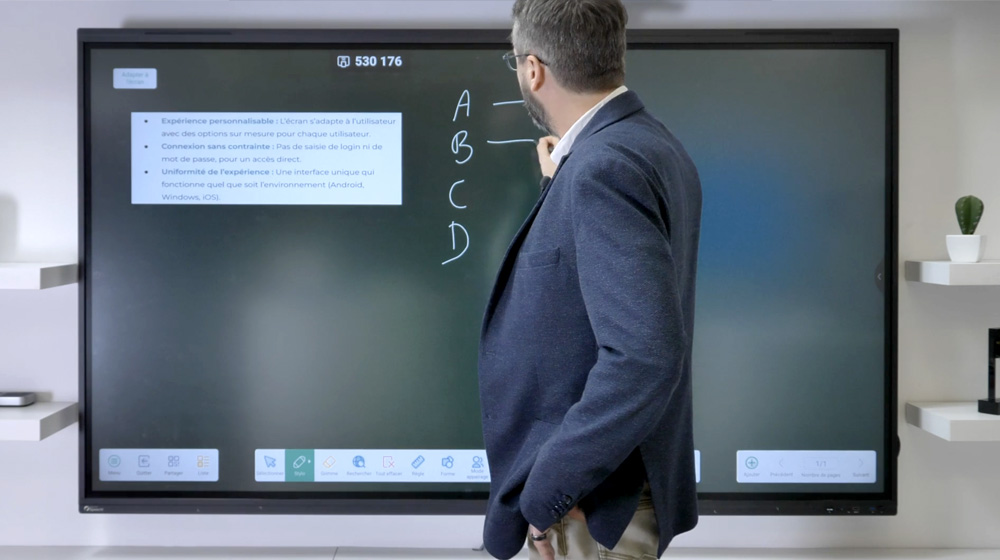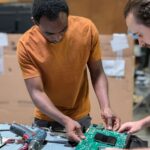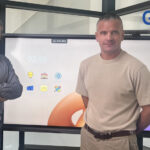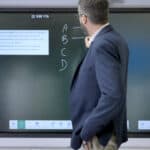October 30, 2025 — a few days ago, Benjamin Brousse, CEO of Speechi, was the “special guest” on the RCF radio show hosted by journalist Michel Picard. The program features people making news in the Hauts-de-France region.
Various topics were discussed, including the role of interactive displays in French schools, how technology supports the inclusion of students with special needs, the importance of field feedback in Speechi’s innovations, and the significance of Made in France in a highly competitive global market. Below you’ll find the video recording of the radio interview, as well as the full written transcript.
🎥 Video recording of Benjamin Brousse’s interview
Watch the radio interview with Benjamin Brousse, CEO of Speechi, on the RCF Hauts-de-France YouTube page, or listen to the podcast on rcf.fr (originally broadcast live on October 30, 2025).
🎙️ Transcript of the show “Le Grand Invité”
on RCF Hauts-de-France
Michel Picard: “Education through innovation. Interactive screens are making their way into classrooms, and Speechi is the French market leader. Good morning, Benjamin Brousse.”
Benjamin Brousse: “Good morning, Michel.”
Michel Picard: “Thank you for joining us in the studio. You’ve been leading Speechi since 2022. To start with — what exactly is Speechi? What do you do?”
Benjamin Brousse: “We’re a Lille-based company — actually, our headquarters are just 100 meters from here. We specialize in interactive displays. We design and develop interactive screens — those large touchscreens you find in classrooms, training rooms, and corporate meeting spaces — as well as educational software.”
Michel Picard: “So you’re not just focused on education — you also work with businesses?”
Benjamin Brousse: “Exactly. Those are our two core markets. We’re the French market leader, just ahead of another big brand that starts with an ‘S’… We design and develop both our hardware and software right here in Lille with our engineering team.”
Michel Picard: “A French company leading the French market — that’s rare enough to celebrate! But let’s go back for a moment to these interactive displays. For listeners who aren’t familiar — what exactly are we talking about? Are they like the old chalkboards we used to have?”
Benjamin Brousse: “We’re probably about the same generation — we had chalkboards, then came whiteboards with dry-erase markers, then interactive whiteboards and projectors, and now, for several years, we’ve had interactive displays. In simple terms, they’re giant tablets that replace old blackboards and allow for much greater interactivity between teachers and students.”
Michel Picard: “How exactly does that interactivity work?”
Benjamin Brousse: “An interactive screen makes students active participants rather than passive observers. They can write, annotate, and interact directly during the lesson. Teachers can share content and let students contribute live.”
Michel Picard: “At what level of education do these screens start being used — kindergarten, or later?”
Benjamin Brousse: “Rarely in kindergarten — it’s not really recommended, though it can be used under strict supervision. The main focus is on primary, middle, and high school — and of course, higher education.”
Michel Picard: “Are all classrooms equipped now?”
Benjamin Brousse: “Not yet. France is still under-equipped — about 30% of classrooms have interactive displays. That means there’s huge growth potential. The government and local authorities are investing, notably through programs like Territoires Numériques Interactifs, to drive adoption and reduce the digital divide.”
Michel Picard: “Do we have feedback on whether these screens actually improve learning outcomes?”
Benjamin Brousse: “There aren’t many official reports yet, but we rely heavily on teachers’ feedback. For example, we’ve equipped thousands of classrooms in Hauts-de-France, including the Jeannine Manuel School in Marcq-en-Barœul — as well as the ones in Paris and London. Teachers are very positive. We also deployed around 2,000 classrooms in Marseille as part of the Marseille en Grand plan. Teachers report that the screens help with engagement and interactivity — they can prepare lessons ahead, connect easily, share materials, and interact dynamically with students.”
Michel Picard: “You’re not the only player in this market. What makes Speechi different?”
Benjamin Brousse: “Good question. Three years ago, with our CTO and innovation director Didier Scellier, we decided to invest heavily in R&D. Hardware is fairly standardized across manufacturers, so differentiation comes through innovation. That’s why we expanded our engineering team in Lille — to focus on user experience and new features.”
Michel Picard: “Has that helped you catch up or even get ahead?”
Benjamin Brousse: “We were already a bit ahead, but it’s made us stand out more clearly. For example, we’ve worked hard on making the user experience smoother — nothing’s worse than a teacher walking into class and struggling to connect securely or share content. We’ve also innovated to make our solutions more inclusive.”
Michel Picard: “Inclusive — in what way?”
Benjamin Brousse: “We’ve developed a new feature called Speechi Talk. It’s a built-in AI function that can instantly translate what the teacher says into different languages. It’s particularly helpful for hearing-impaired students or those with learning challenges, and it fosters inclusion. Given France’s recent PISA results, we think companies have a role to play in improving accessibility and learning equality.”
Michel Picard: “Do you get direct feedback from users — from students or teachers who benefit from this?”
Benjamin Brousse: “Absolutely. One of our core strategies is user proximity. We support teachers with training and make sure our tools remain simple and accessible. For instance, language learning is a major challenge today in a globalized world. Speechi Talk helps make language classes more engaging and accessible, especially for students who struggle — they can follow along more easily.”
Michel Picard: “Since Speechi Talk isn’t limited to France, are you developing internationally?”
Benjamin Brousse: “Yes — international revenue has grown from 10% in 2022 to 30% this year. We’re expanding mainly in French-speaking countries…”
Michel Picard: “Belgium, Switzerland, Luxembourg…”
Benjamin Brousse: “Exactly. We’re number 2 in Switzerland, number 1 in Luxembourg, number 2 in Belgium. Africa is also a strong growth region for us — it’s young, dynamic, and developing fast.”
Michel Picard: “But connected screens also raise cybersecurity concerns. Many institutions have suffered cyberattacks lately. How do you handle that?”
Benjamin Brousse: “Security and data sovereignty are key. With foreign-made devices, data is often stored in the cloud overseas — sometimes in the U.S., which raises privacy issues. With Speechi, clients can choose where their data is hosted. For example, in Switzerland, where data protection is strict, local hosting is essential — otherwise, we simply couldn’t work with schools there.”
Michel Picard: “That’s a major topic — data sovereignty. The Île-de-France region, for example, recently rejected Microsoft solutions in favor of Made in France tools. Is this a priority for you?”
Benjamin Brousse: “Yes, it’s both a strategic and ethical priority. It gives us a competitive advantage, but more importantly, it responds to real client concerns. Given the current geopolitical climate, many organizations want control over where their data is stored and who can access it.”
Michel Picard: “Who are your clients exactly?”
Benjamin Brousse: “We work with both the national education system and local governments — cities, schools, colleges, and high schools — through a network of about 100 distributors across France.”
Michel Picard: “Some people worry that technology might weaken students’ basic skills. Do children still know how to write by hand, for example?”
Benjamin Brousse: “That’s an important issue. The 2024 ‘À la recherche du temps perdu’ report commissioned by the French presidency raised concerns about screen time and children. We take that seriously. Our goal isn’t to replace traditional learning but to make it more interactive. The real problem with screens is passivity — being exposed to random content without reflection. Our interactive screens do the opposite — they make students active participants in their learning. The problem isn’t the screen itself, it’s how it’s used.”
Michel Picard: “When you took over in 2022, you aimed to expand internationally. What are your goals now?”
Benjamin Brousse: “Our top priority remains strengthening our leadership in France, especially since competition is intense — some brands use aggressive commercial tactics.”
Michel Picard: “Has Made in France helped you?”
Benjamin Brousse: “It helps, yes, though we’d like to see it emphasized more in public tenders. It’s a global market, so we play by global rules, but Made in France is an advantage — especially in service and support. Our clients work with French teams, get French-language customer service, and benefit from local installation and training. That’s a big plus compared to overseas brands facing time-zone and language barriers.”
Michel Picard: “You didn’t come from the education sector originally. What have you learned since taking over Speechi?”
Benjamin Brousse: “A lot. Competing globally teaches you resilience — not everyone plays by the same rules, so adaptability is key. You learn to stay close to the field — to teachers and users. The question isn’t whether AI or digital tools will replace teachers — it’s how they can serve them. That’s what innovation should mean: empowering teachers, not replacing them.”
Michel Picard: “So, to wrap up — when we talk about screens in primary schools, it’s no longer a question of for or against screens, but how to use them, right?”
Benjamin Brousse: “Exactly — it’s about using them wisely and in a structured way. That’s the role of educators, and they know how to do it. The key question now is not whether to use screens, but how and with which tools.”
Michel Picard: “Thank you very much, Benjamin Brousse, for joining us. A reminder that you’ve been CEO of Speechi since 2022 — the company bringing schools into the age of Education 2.0.”
